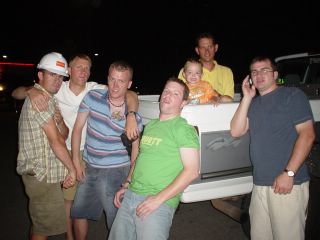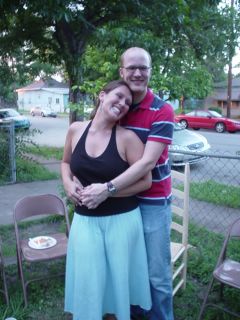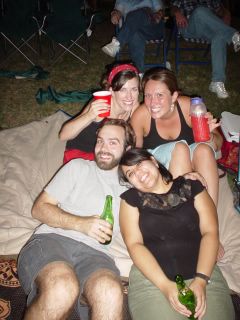I was driving somewhere with my mother recently, while back home for a visit, and at some point in our conversation I mentioned that, if ever I was blessed to have a family, I would like to name my son Isaac. I told her I liked that name. She agreed. To be sure, there have been some well-known Isaac's in this world, so my son would have some namesake role models he might look to as he grew up. Isaac Newton, who figured out that pesky thing that keeps us all rooted to this wonder-filled world, gravity. Isaac Backus, a well-known forefather to Baptists in this country, he helped affect congressional recognition of such an important doctrine, the separation of Church and state. Isaac Watts, an author of some of the greatest words contained in our hymnals. However, it was not because of any of these great men that I mentioned to my mother that I liked the name Isaac. Though I'm sure she was just thankful that I still have some hope, however futile, of one day having a family (grandchildren for her), I went ahead and explained the key reason for giving my future child this namesake. That is, it is inspired by perhaps the earliest Isaac, the Isaac of Genesis. Why him? Simply this: his name means "laughter."
I once wrote a horridly mediocre novella for the sole purpose of seeking to draw a laugh or two (or three or four or twenty) out of my friends back home. They were all characters in it and I placed them in peculiarly unrealistic situations. Last Christmas I printed and packaged it nicely and gave it to them as a Christmas present. At the bottom of the title page, I wrote a statement in passing that only later I realized contained an astonishingly deep truth as far as I see it. It was this: "Laughter is a contagion, and the healthiest people in the world are they who refuse vaccination." Though this is quite an awkward little quote, it is something that, the more I live, the more I believe in earnest.
I am desperate for laughter. Laughter with friends, laughter in the bumbling company of myself alone, laughter anywhere and everywhere. I am a terrible conversation hog, and most of what I contribute to conversations with friends and family have some sort of punchline, whether original or ripped off from some comedian or television show. I am addicted to amusing myself and others, no matter in how subtle a way. This is strange, mainly because I see this is a truth in almost every aspect of my life, except two significant areas.
Rarely does my writing - what I consider my serious writing - include a noticeable amount of humor. Oh, every once in a while I will throw in what I feel is a stretch of amusing dialogue, or a playful description, but much of my subject matter and the themes I explore through my pen are morose in tone, somewhat melancholy, digging into the unamusing dirt of the struggles of life. I desire, above all things, to communicate a sense of grace within my writing, within these stories I labor through gladly and mull over painstakingly. Yet this grace I write of is so often a sad grace. I was set to thinking about all this, about laughter, when I read one of the most beautiful sentences I have ever encountered in a novel. Marilynne Robinson, in her extraordinary, Pulitzer Prize-winning book, Gilead, writes, "I walked up early to the church, and there she was, waiting for me by the steps, hoping she might have a word with me. At that point, I began to suspect, as I have from time to time, that grace has a grand laughter in it."
Grace has a grand laughter in it. This is what I so desire to remember both when I write ... and in the other aspect of my life I often find laughter is lacking. That is, my journey of faith. My life as a Christian, as a part of the Church, is many times devoid of anything even resembling amusement. I am so greatly concerned for the Church these days that it is hard to find anything to even crack a smile at, let alone bubble forth with happy laughter. However, I believe we are called by God to never forget the hilarity that blows to and fro through this life. This was his revelation to old Abraham and Sarah, who gave birth so very late that all one can do is laugh at the reality of it all.
Frederick Buechner, in one of his most beautiful stories, speaks of the importance laughter has for the saved life of a Christian. In The Sacred Journey, he writes of his conversion experience, when he, as an unchurched person all his life, sat and heard the renowned George Buttrick preach in a Manhattan church. Buttrick was speaking of Christ being "crowned" by those who faithfully believe on him. He said, "Jesus refused the crown that Satan offered him in the wilderness ... but he is king nonetheless because again and again he is crowned in the hearts of people who believe in him. And that inward coronation takes place ... among confession, and tears, and great laughter." It was that last phrase that brought tears to Buechner's eyes and hope to his heart.
Confession, and tears, and great laughter. Such should be the sacred stones of a Christians, those carefully stepped upon as he or she crosses this great river called Life. These were of course the feelings weighing upon Abe and Sarah as they cradled little Isaac in their bony old arms. Confession that God did indeed know what he was doing, tears at both the long, sad strain of waiting and the joyous receiving of such a gift, and laughter ... laughter at the grand wonder manifested before them, squirming and crying and so completely alive. Laughter. There could be no better name for him.
(Most likely attempting to say something funny to Jill and Chad)














